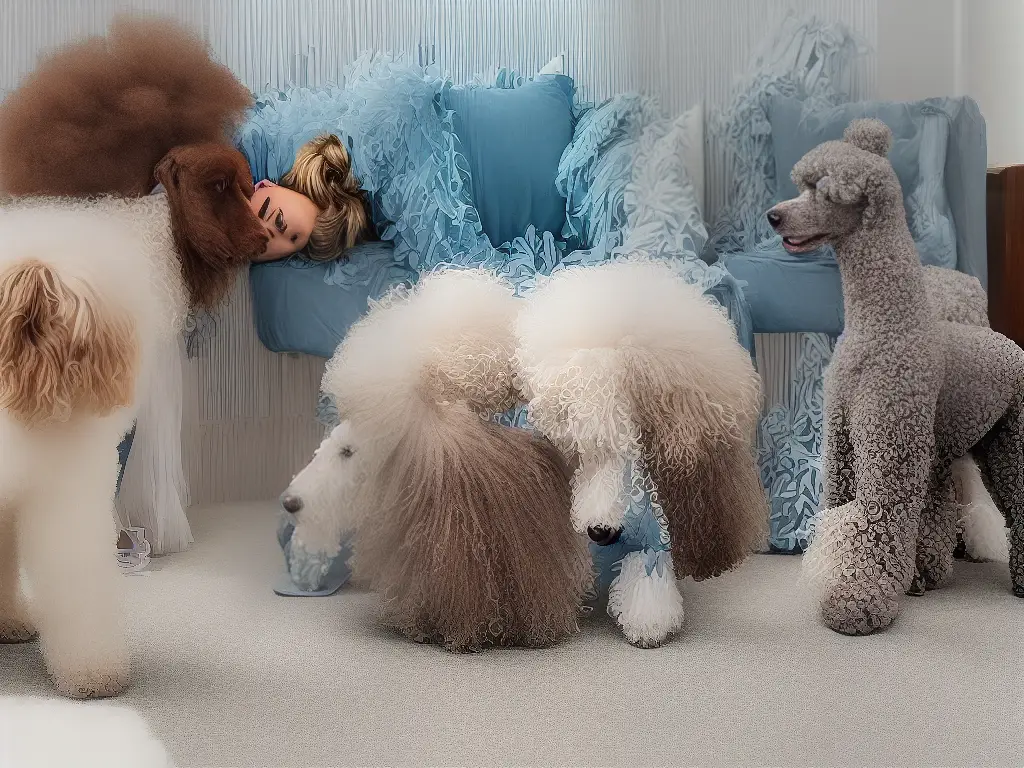Poodle Health Issues
Poodles are a popular breed known for their intelligence, elegance, and unique coat types. Despite being a relatively healthy breed, poodles can be prone to certain health issues that can impact their wellbeing. Gaining a well-rounded understanding of these challenges can help owners care for their beloved pets and ensure they lead a healthy and happy life. In this article, we will explore various topics of poodle health, including genetic disorders, allergies and skin conditions, dental health, epilepsy, grooming and coat care, exercise, nutrition, behavioral issues, and preventative healthcare.
Genetic Disorders
One common genetic disorder in Poodles is hip dysplasia, a heritable condition in which the thighbone doesn’t fit snugly into the hip joint. This can lead to arthritis, discomfort, and limited mobility as the dog ages. Larger Poodles are more prone to developing hip dysplasia, although it can occur in all sizes of Poodles. Dog owners should make sure their Poodles maintain a healthy weight and engage in regular exercise to help prevent the exacerbation of hip dysplasia, and be mindful of their dog’s movement and signs of pain.
Progressive retinal atrophy (PRA) is another genetic disorder affecting the eyes of Poodles. This condition is characterized by a gradual degeneration of the retina, ultimately leading to blindness. PRA is incurable, but the slow progression of the disorder allows most dogs to adapt to their decreasing vision adequately. To minimize the potential spread of this disease, breeding Poodles should undergo genetic testing for PRA before mating to ensure they do not pass the gene onto their offspring. Inherited forms of PRA in Poodles include prcd-PRA (progressive rod-cone degeneration) and Type 2 or 3 PRA, which all can be detected through available genetic tests.
Von Willebrand’s disease (vWD) is another genetic disorder affecting Poodles, particularly the Standard and Miniature varieties. vWD is a blood clotting disorder caused by a deficiency in von Willebrand factor, a protein essential in forming blood clots. Poodles affected by vWD may bleed excessively after an injury, surgery, or even spontaneously. It is essential to know if your Poodle has this disorder since it may require additional precautions during medical procedures to prevent life-threatening bleeding. DNA testing is available to detect vWD in Poodles and should be done before breeding to avoid passing the disorder onto future generations.
Another genetic disorder to be aware of in Poodles is sebaceous adenitis (SA), an inflammatory skin disorder. This condition affects the sebaceous glands, leading to hair loss, scaling, and skin infection. SA is more common in Standard Poodles but can also affect other Poodle types. Diagnosis is made through a skin biopsy, and while there is no cure for SA, it can be managed with proper grooming and medication to minimize infection. It is vital to ensure that breeding Poodles do not have SA to prevent its spread within the population.
One important health issue in Poodles is the potential development of Addison’s Disease, an endocrine disorder caused by inadequate production of certain hormones by the adrenal glands. This disorder can result in vomiting, diarrhea, lethargy, and even fatal shock. Although the exact cause of Addison’s disease is not yet fully understood, there appears to be a genetic component, particularly in Standard Poodles. Regular check-ups with the veterinarian and an understanding of the symptoms can help identify and treat Addison’s Disease in Poodles as soon as possible.

Allergies and Skin Conditions
Another common health concern for Poodles is their susceptibility to allergies and skin conditions, which can result in symptoms such as itching, redness, and inflammation of the skin. One such condition is atopic dermatitis, a chronic inflammatory skin disease often caused by an overreaction of the immune system to environmental allergens like pollen, mold, and dust mites. Poodles are particularly vulnerable to this condition due to their dense curly coat that can trap allergens close to the skin. Symptoms of atopic dermatitis in poodles include excessive scratching, licking, and biting at the affected areas. It is often found on the paws, face, and in skin folds. Monitoring these symptoms and seeking veterinary care can help manage and treat these skin conditions in Poodles.
Another common skin issue in poodles is flea allergy dermatitis, which is a hypersensitive reaction to flea saliva. When a flea bites a poodle, its saliva is deposited on the skin, and if the dog is allergic, an intense itching sensation can occur. This often results in excessive scratching, hair loss, and the formation of crusty skin lesions. This condition is most commonly found around the base of the tail, lower back, and hind legs.
To manage the symptoms of these allergies and skin conditions, it is important for poodle owners to ensure a regular grooming routine, including frequent brushing and bathing to help remove allergens from the coat and skin. Medicated shampoos and conditioners specifically designed for dogs with sensitive skin can also be used during bathing to help soothe irritation and provide relief from itching.
There are also medical treatments available for poodles with severe allergies and skin conditions. Oral medications such as corticosteroids and antihistamines can help manage inflammation and itching. In some cases, veterinarians may also recommend a series of allergy shots, known as immunotherapy, to help desensitize the dog to the specific allergens causing the problem. Regular check-ups with a veterinarian are essential to monitor progression and ensure the appropriate treatment is being provided.
As a poodle owner, it’s essential to be proactive in maintaining your dog’s health, starting with minimizing exposure to potential allergens. By providing a clean, allergen-free living environment, using hypoallergenic bedding, and limiting outdoor exposure during high pollen seasons, you can help prevent allergies and skin conditions in your poodle. Additionally, feeding them a balanced and hypoallergenic diet can improve overall skin health and reduce the risk of developing such issues.

Dental Health
Another crucial aspect of a poodle’s overall well-being is dental health. Poodles often have smaller mouths and crowded teeth, making them prone to developing periodontal disease and gingivitis. Ensuring regular dental care for your poodle, such as brushing their teeth and scheduling professional cleanings, can greatly reduce the risk of these conditions and prevent complications like tooth loss and infection. Besides, maintaining proper dental hygiene can also save both you and your poodle from the unpleasant experience of bad breath.
Periodontal disease is a common dental health issue for poodles, occurring when the bacteria present in your poodle’s mouth lead to plaque and tartar buildup. If left untreated, periodontal disease can cause gum inflammation (gingivitis), irreversible harm to the supportive structures around the teeth, and tooth loss. The bacteria from periodontal disease can also enter the bloodstream, potentially causing harm to vital organs such as the heart, liver, and kidneys. It is important to diagnose and treat periodontal disease in its early stages to prevent irreversible damage and protect your poodle’s overall health.
One effective way to battle periodontal disease and maintain good dental hygiene in poodles is by implementing a daily tooth brushing routine. Using a toothbrush specifically designed for dogs, along with toothpaste formulated for canines to avoid harmful ingredients such as xylitol, helps remove plaque and prevent the buildup of tartar. Ideally, you should introduce your poodle to tooth brushing as early as possible to make it a familiar and comfortable process. Regularly inspecting your poodle’s teeth and gums for signs of dental issues such as redness, swelling, or loose teeth is also essential in maintaining dental health.
In addition to tooth brushing, providing your poodle with dental chews or toys specifically designed for oral health is another beneficial way to promote dental hygiene. These chews and toys can help scrape away plaque buildup and provide a mechanical cleaning action that is difficult to achieve with regular tooth brushing alone. Additionally, feeding your poodle a balanced diet comprised of dry kibble can help maintain dental health due to the abrasive action on the teeth and the prevention of excessive tartar buildup.
Maintaining your poodle’s dental health is crucial for their overall well-being. Regular veterinary dental cleanings can help identify potential dental issues before they escalate. By practicing proper dental care at home and scheduling routine checkups and professional cleanings at your veterinarian’s office, you can ensure the continued oral health of your poodle.

Epilepsy
Besides dental health, it’s essential to be informed about other potential health issues in poodles, such as epilepsy. This neurological disorder, characterized by unpredictable seizures, results from abnormal brain activity. Seizures can manifest in various ways, including muscle spasms, loss of consciousness, and uncontrolled behaviors, making it vital to work closely with your veterinarian for early detection and appropriate treatment.
If you suspect your poodle is experiencing a seizure, it is essential to consult your veterinarian immediately for a proper diagnosis and treatment plan.
There are different forms of epilepsy that can affect poodles. These include idiopathic (unknown cause), symptomatic (caused by an underlying condition), and cryptogenic (assumed to be symptomatic but the cause can’t be identified). Some possible causes of symptomatic epilepsy in poodles include brain tumors, infections, head trauma, congenital abnormalities, or exposure to toxins. It is essential to identify the cause of the seizures, as treatment may vary based on the underlying condition.
Managing a poodle with epilepsy typically involves medication to help control the frequency and severity of the seizures. The most common medications used are anticonvulsants such as phenobarbital or potassium bromide. These medications work by decreasing the neuronal activity in the brain, reducing the likelihood of seizure occurrence. It is crucial to work closely with your veterinarian to find the right medication and dosage for your poodle, as every dog may react differently to these medications. Blood tests and monitoring are necessary to ensure the medication’s efficacy and to adjust the dosage as needed.
Recognizing and responding to your poodle’s seizures is also essential to managing their epilepsy effectively. During a seizure, it is crucial to remain calm and ensure your dog’s safety. Clear the area of any objects that might hurt your poodle, and refrain from putting anything in their mouth, as it may cause injury. Keep your hands away from their mouth, as they may unintentionally bite during a seizure. It is also helpful to keep track of the duration and frequency of the seizures, as this information can aid your veterinarian in adjusting the treatment plan.
Living with a poodle with epilepsy can be challenging, but it is crucial to maintain regular veterinary visits and follow the prescribed treatment plan closely. Provide a stable and stress-free environment for your poodle, and consider getting involved in a support group or online community for pet owners dealing with epilepsy. In addition to managing health concerns such as epilepsy, it is also important to address general care, such as proper grooming and coat maintenance, for poodles.

Grooming and Coat Care
Poodles have a unique, curly hair type that continuously grows and doesn’t shed as much as other dog breeds, making regular grooming essential in order to prevent matting and maintain proper hygiene. Grooming not only helps to maintain a clean and neat appearance but also allows for the opportunity to monitor your poodle’s skin condition for any issues or abnormalities. By managing both health issues like epilepsy and ensuring proper grooming, you can provide the best care for your poodle friend.
Different coat types may require slightly different grooming techniques or schedules, but all poodles will benefit from consistent and attentive grooming practices.
Poodle Coat Types
- Curly: Characterized by tight, dense curls. Regular grooming is necessary to prevent matting and remove dirt and debris trapped in the fur.
- Wavy: Softer curls that lay closer to the body.
- Corded: Form natural cords or dreadlocks. Require specific grooming techniques to maintain the desired appearance.
Regardless of coat type, a regular grooming routine for poodles typically includes brushing, bathing, clipping or trimming, and checking for common health issues.
- Brushing: At least a few times a week, using a slicker brush or comb to loosen and remove tangles and dead hair. This is important to prevent matting.
- Bathing: Frequency depends on your poodle’s lifestyle and coat type, but generally every 3-6 weeks using a gentle, dog-safe shampoo.
- Clipping or Trimming: Professional grooming appointments should be scheduled every 4-6 weeks to maintain a manageable coat length and style.
- Checking for Common Health Issues: Monthly nail trims and regular inspections of the ears, teeth, and eyes can help ensure overall poodle health.
One common coat problem encountered by poodle owners is matting, which can lead to discomfort, irritation, and even infection if left untreated. When grooming your poodle, it is important to gently separate any mats you find with your fingers, a wide-toothed comb, or specialized mat-splitting tools. While mat removal is best performed by a professional groomer, it is important for owners to familiarize themselves with the process to maintain their poodle’s comfort and health between appointments.
Poodles, while being an active and intelligent breed, also come with certain health concerns. They are prone to specific skin conditions, such as allergies or sebaceous adenitis, which can negatively impact the health of their coat. Regular grooming allows owners to closely monitor their poodle’s skin for any signs of irritation, dryness, or infection. By addressing these issues with appropriate veterinary care and topical treatments, poodle owners can help keep their dog’s coat healthy and free from discomfort. Consistent grooming and coat care practices play a crucial role in maintaining overall poodle health and should be prioritized as part of responsible pet ownership.

Exercise and Nutrition
Along with grooming, exercise and nutrition are essential components to maintaining a poodle’s health. Regular exercise is crucial for poodles to keep them physically fit and mentally stimulated. It is recommended that standard poodles get at least one to two hours of exercise daily, while miniature and toy poodles can benefit from at least 30 to 60 minutes. However, it is essential to be aware of the breed-specific risks and requirements associated with exercising poodles. For example, young poodles and those with joint issues should avoid excessive jumping or high-impact activities that can put extra strain on their joints. Proper exercise, nutrition, and grooming all contribute to a happy, healthy poodle and a fulfilling pet ownership experience.
Nutrition plays a significant role in maintaining a poodle’s overall health. A balanced diet containing high-quality protein, carbohydrates, fats, vitamins, and minerals is essential for maintaining strong muscles, healthy skin, and a well-functioning immune system. Essential fatty acids, such as omega-6 and omega-3 fatty acids, are vital for a poodle’s skin and coat health. It’s crucial to choose a suitable dog food that meets your poodle’s specific requirements and size, taking their age, weight, and activity level into account. Consulting with a veterinarian is recommended to determine the optimal diet for your particular poodle.
Overexertion and insufficient rest periods can lead to various health issues, especially in puppies, senior poodles, or those with pre-existing health conditions. Activity levels should be closely monitored, and signs of excessive panting, limping, or reluctance to continue should be seen as indicators of potential overexertion. Additionally, poodles are known to be prone to hip dysplasia, a genetic disorder that can be exacerbated by an improper exercise routine or obesity. Maintaining a healthy weight through proper diet and exercise reduces the risk of developing such health issues.
An improper diet can also contribute to various poodle health issues. In particular, feeding a poodle a diet that does not meet its nutritional needs can lead to malnutrition, obesity, or specific nutrient deficiencies. For example, a diet lacking sufficient protein can result in protein-losing enteropathy or hypoalbuminemia, both of which can be detrimental to a poodle’s health. In addition, some poodles may be susceptible to food allergies or intolerances, requiring a specialized diet to manage symptoms and prevent long-term complications.
As a responsible poodle owner, it is essential to be well-informed about their specific exercise and nutrition requirements in order to promote a healthy lifestyle and prevent potential health issues. Routine check-ups with your veterinarian can help identify and address concerns early, ensuring that your poodle remains healthy and content throughout their life. Providing your pet with abundant love, attention, and mental stimulation is equally important, as these factors contribute significantly to their overall well-being.

Behavioral Issues
Not only are poodles known for their intelligence and affectionate nature, which make them wonderful companions, they, like any breed, can also exhibit common behavioral issues such as separation anxiety and obsessive barking. Recognizing the triggers and employing effective strategies to address these concerns is crucial in maintaining a healthy and nurturing bond between you and your poodle. With consistent care and understanding, you can ensure that your beloved poodle remains an integral part of your family for years to come.
Separation anxiety occurs when a dog exhibits distress and problematic behavior upon being separated from their owner. Poodles, in particular, can be prone to this condition due to their strong attachment and devotion to their families. Signs of separation anxiety may include excessive barking, destructive behavior, and attempts to escape when left alone. Addressing this condition may involve gradual desensitization, counterconditioning, or offered therapies like doggy daycare or increasing the time spent with other dogs. Ensuring a routine and calm environment may help poodles feel more secure when left alone.
On the other hand, obsessive barking is another common behavioral issue in poodles. It can be triggered by various factors such as boredom, frustration, fear, or simply seeking attention. Identifying the cause of obsessive barking is the first step to address this problem. By providing mental stimulation through interactive toys, puzzle feeders, or regular obedience training can help alleviate boredom-induced barking. If it is anxiety or fear-related, counterconditioning techniques may be employed to ease a poodle’s discomfort in response to a specific stimulus.
Environmental management strategies can be beneficial to prevent obsessive barking. For example, removing access to stimuli that can trigger barks (such as blocking access to windows overlooking the street) can help in reducing the frequency of such behavior. Additionally, teaching your poodle the “quiet” command can be an effective tool in curbing excessive barking.
Creating a well-behaved and happy poodle starts with patience and consistency in implementing any behavioral modification plan. Working with a qualified animal behaviorist or trainer can provide professional guidance tailored to your poodle’s specific needs. Ensuring proper exercise, a healthy diet, and a stimulating environment are also significant factors contributing to your poodle’s overall well-being, ultimately reducing the chances of behavioral issues arising. Remember that early intervention and consistent reinforcement can prevent behavioral patterns from becoming ingrained, leading to a healthier and happier relationship between poodle and owner in the long run.

Preventative Health Care
Alongside behavioral training, preventative health care plays a crucial role in maintaining your poodle’s overall well-being. Appropriate vaccinations, parasite prevention, and routine veterinary checkups are essential in ensuring your poodle remains healthy and happy throughout its life. By learning about and committing to a combined approach of consistent training and preventative care, you can vastly decrease the risk of serious health issues and behavioral problems, ultimately leading to a strong and lasting bond between you and your beloved pet.
Vaccinations: Vaccinations form a critical component of any poodle’s preventative health care plan. Typically, puppies receive a series of vaccinations starting at around 6-8 weeks of age, with boosters given every 3-4 weeks until they reach 16 weeks. Core vaccines for poodles include canine distemper, parvovirus, adenovirus, and rabies. In certain cases, your veterinarian may also recommend non-core vaccines based on your poodle’s specific risk factors, such as exposure to other dogs, outdoor activity levels, or geographical location. It is essential to follow your veterinarian’s vaccination schedule to ensure that your poodle remains protected from potentially life-threatening diseases.
Parasite Prevention: Parasite prevention is another essential component of poodle health care. Poodles are susceptible to various internal and external parasites, including fleas, ticks, heartworms, and intestinal worms. These parasites can transmit diseases and cause discomfort, illness, or even death in severe cases. Preventing and controlling parasites is accomplished through various means, including monthly oral or topical treatments, specialized collars, and regular grooming. Consult with your veterinarian to determine the most effective parasite prevention methods for your particular poodle, and remember that consistency and adherence to a prescribed schedule are vital to maintaining a healthy, parasite-free environment for your pet.
Routine Veterinary Checkups: Routine veterinary checkups are crucial to ensuring that any potential health issues in poodles are identified and treated as early as possible. It is generally recommended that poodles receive a comprehensive wellness examination at least once a year, with more frequent checkups advised for senior dogs or those with ongoing health concerns. During a checkup, your veterinarian will assess your poodle’s overall health, review vaccination and parasite prevention schedules, and potentially perform diagnostic tests to identify any hidden issues. Regular veterinary visits allow for early detection and treatment of minor health problems, preventing them from escalating into severe, chronic, or even life-threatening conditions.
Diet and Exercise: Furthermore, a significant aspect of preventative health care for poodles involves providing them with a high-quality diet and regular exercise. A well-balanced, age-appropriate diet will support optimal growth and development for puppies and will ensure that adult poodles maintain a healthy body weight. Additionally, engaging in regular physical activity will keep your poodle’s heart, lungs, and muscles in peak condition, promoting overall health and longevity. Always consult with your veterinarian to determine the ideal nutritional and exercise guidelines for your specific poodle’s needs, and be prepared to make adjustments based on factors such as age, weight, and activity level. By combining a balanced diet and exercise regimen with vaccinations, parasite prevention, and routine veterinary checkups, you can rest assured that you are taking the necessary steps to provide your poodle with the best possible care and support for a healthy, happy life.

Having a thorough understanding of poodle-specific health concerns can enable owners to provide the best care for their pets. By being proactive with preventative healthcare, proper grooming, exercise, nutrition, and addressing any potential issues such as behavioral problems, owners can ensure their poodle lives a long and fulfilling life. Further research, open communication with your veterinarian, and dedication to keeping your poodle healthy will make a significant impact on their overall wellbeing.
